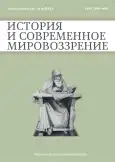Coverage of Soviet Diplomats’ Activity at the United Nations on the Pages of «Pravda» and «Izvestiya» as a Factor of Political Mobilization of the Population of the USSR during Korean War
- Authors: Antoshin A.V.1, Zapariy J.V.1
-
Affiliations:
- Ural Federal University named after the first President of Russia B. N. Yeltsin
- Issue: Vol 4, No 3 (2022)
- Pages: 68-75
- Section: Articles
- URL: https://journal-vniispk.ru/2658-4654/article/view/147251
- ID: 147251
Cite item
Abstract
Full Text
##article.viewOnOriginalSite##About the authors
Alexey V. Antoshin
Ural Federal University named after the first President of Russia B. N. Yeltsin
Email: alex_antoshin@mail.ru
Dr. Sci. (Hist.), Professor, Department of Oriental Studies Yekaterinburg, Russian Federation
Julia V. Zapariy
Ural Federal University named after the first President of Russia B. N. Yeltsin
Email: zapary.iulia@urfu.ru
Cand. Sci. (Hist.), Associate Professor, Department of Modern and Contemporary History Yekaterinburg, Russian Federation
References
- Antyukhova E. A. The initial stage of the Cold War and the process of building the image of NATO in the Soviet periodical press of the 1940s. (based on the newspaper «Pravda») // Bulletin of the Tomsk State University. Story. 2018. No. 51. P. 5-12.
- Brandenberger D. Stalin's Russocentrism. Soviet mass culture and the formation of Russian national identity. 1931-1956 / Per. from English. N. Aleshina, L. Vysotsky, L. Pantina. M.: Political Encyclopedia (ROSSPEN), 2017. 407 p.
- Vanin Yu. V. The Korean War (1950-1953) and the UN. M: Nauka, 2006. 286 p.
- Gaiduk I.V. In the labyrinths of the cold war: the USSR and the USA in the UN, 1945-1965. M: Nauka, 2012. 331 p.
- Zapariy Yu. V. UN peacekeeping operations: the evolution of visibility and its implementation (mid-40s - early 70s of the XX century). Yekaterinburg, UMC-UPI Publishing House. 2005. 178 p.
- Zubkova E. Yu. Post-war Soviet society: politics and everyday life. 1945-1953 M.: IRI RAS Publishing House, 1999. 229 p.
- Calvocoressi P. World politics after 1945. Moscow: International relations, 2000. Book. 1. 464 p.
- Kolesnikova A. G. «The Image of the Enemy» in Soviet Propaganda of the Cold War Period: From Events to Image // Privolzhsky Scientific Bulletin. 2011. No. 3. P. 30-35.
- Lelchuk V. S., Pivovar E. I. The mentality of the Soviet society and the «cold war» (to the formulation of the problem) // Domestic history. 1993. No. 6. P. 63-78.
- International relations after the Second World War / ed. N. N. Inozemtseva. M.: Gospolitizdat, 1963. Vol. 2, 744 p.
- Protopopov A. S. The Soviet Union and the UN. From the history of the USSR conflict for the peace and independence of peoples (1945-1957). M.: Politizdat, 1958. 212 p.
- Torkunov A. V. Mysterious war: Korean conflict 1950-1953. M.: ROSSPEN, 2000. 312 p.
- Fedorov A. V. Comparative analysis of medical stereotypes during the Cold War and ideological confrontation // Media education. 2009. No. 4. P. 62-84.
- Filitov A. M. «Cold War»: historiographic discussions in the West. M.: Nauka, 1991. 200 p.
- Chubaryan A. O. New history of the cold war // New and evolutionary history. 1997. No. 6. P. 3-22.
- Chubaryan A. O. The origin of the «cold war» in the historiography of the East and West // New and evolutionary history. 1991. No. 3. P. 63-67.
- Aronsen L., Kitchen M. The Origins of the Cold War in Comparative Perspectives. New York, 1988. 232 р.
- Brands H. W. Cold Warriors. Eisenhower`s Generation and American Foreign Policy. New York, 1988. 252 р.
- Brinkley D. Dean Acheson: The Cold War Years. 1953-1971. New Haven; London, 1992. 512 p.
- Brown J.A. Techniques of Persuasion: From Propaganda to Brainwashing. London, New York, 1964. 325 р.
- Martin J. L. International Propaganda: Its Legal and Diplomatic Control. Minneapolis, 1958. 292 p.
- The Oxford handbook of the Cold War/ Eds. R/ H Immerman; P. Goedde. Oxford: Oxford University Press, 2013. 688 р.
- Pechatnov V. Exercise in Frustration: Soviet Foreign Propaganda in the Early Cold War, 1945-47// Cold War History Vol,1 No. 2 (2001). Pp.1-27.
- Risso L. Radio Wars: Broadcasting in the Cold War // Cold War History, 2013. Vol. 13. Issue. 2. P. 145-152.
- Shabo M.E. Propaganda and persuasion techniques. Clayton (DE), 2008. 160 pp.
- Siegelbaum L., Sokolov A. Stalinism as a Way of Life: A Narrative in Documents. Yale University Press, 2000. 460 р.
- Snyder A. Warriors of Disinformation: American Propaganda, Soviet Lies and The Winning of the Cold War. New York, 1995. 321 p.
- Taylor P.M. Munitions of the Mind: A History of Propaganda from the Ancient World to the Present Day. Manchester, 2003. 360 p.
Supplementary files








